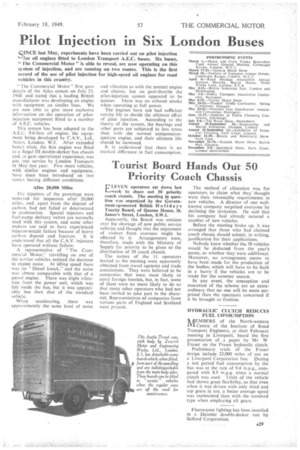Tourist Board Hands Out50 Priority Coach Chassis
Page 5

If you've noticed an error in this article please click here to report it so we can fix it.
r LEVEN operators sat down last T—dweek to share out 50 priority coach chassis. The meeting in question was organized by the Government-sponsored British H o 1 i-d a y s Tourist Board, of Queens House, St. James's Street, London &W.I.
Apparently, the Board was anxious over the shortage of new public service vehicles and thought that the enjoyment of visitors from overseas might be affected by it. Arrangements were, therefore, made with the Ministry of Supply for priority to be given to the distribution of 50 coach chassis.
The names of the 11 operators invited to the 'meeting were apparently obtained from travel agencies and trade associations. They were believed to be companies that were most likely to carry foreign tourists, but, in fact, some of them were no more likely to do so that many other operators who had not been invited to take part in the shareout. Representatives of companies from various parts of England and Scotland Were present. The method of allocation was for operators to claim what they thought were their reasonable requirements in new vehicles. A director of one wellknown company surprised everyone by declining the invitation. He said that his company had already secured a number of new vehicles.
Before the meeting b'roke up, it was arranged that those who had claimed coach chassis should submit, in writing, justification for their applications.
Nobody knew whether the 50 vehicles would. he deducted from the year's quota, or whether they were additional. Moreover, no arrangement seems to have -been made for the production of the bodies,, which will have to be built in a hurry if the vehicles are to be ready for the summer season.
In any event, the conception and execution of the scheme are so extraordinary that no one will be more surprised than the operators concerned if it be brought to fruition.
HYDRAULIC CLUTCH REDUCES FUEL CONSUMPTION
MEMBERS of the North-western Centre of the institute of Road Transport Engineers, at their February meeting in Liverpool, heard the first presentation of a paper by Mr W Fraser on the Fraser hydraulic clutch.
Preliminary trials of the Fraser design include 25,000 miles of use on a Liverpool Corporation bus. During a test period fuel consumption by the bus was at the rate of 9.4 m.p.g., compared with 8.9 m.p.g. when a normal clutch was used. Trials of the vehicle had shown great flexibility, so that even when it was driven with only third and top gears in use, a better average speed was maintained than with the standard type when employing all gears.
Fluorescent lighting has been installed in a Daimler double-decker run by Salford Corporation.


























